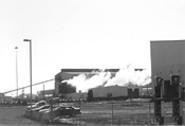Yet Hayes didn't anticipate how quickly the end would come. One day he had a good paycheck and full benefits working at the Trico Steel mill outside Decatur, Alabama. The next, he didn't. In late March, the company shut its doors after only four years in business.
The news was little more than a footnote in Cleveland, reported as one of many setbacks to LTV's bid for profitability. Since Trico's inception, LTV, its largest shareholder, had lost millions on the mini-mill, a joint venture with British Steel and Sumitomo Heavy Industries of Japan.
Five months later, Trico has largely been forgotten in Cleveland, while LTV continues to trudge through Chapter 11 bankruptcy reorganization. In Alabama, however, there has been little to temper the domino effect set off by LTV's collapse. When Trico closed, it laid off all but a handful of the company's 350 employees. President and CEO Richard Veitch announced the decision at a meeting March 22. The plant was closing immediately. Benefits expired at midnight that night. "Everybody just looked at each other like you'd slapped them," says Hayes.
This summer, employees filed a class-action suit in federal bankruptcy court, claiming Trico violated the Worker Adjustment and Retraining Notification (WARN) Act, which requires companies with more than 100 employees to provide 60 days' written notice of plant closings. After years of struggling with equipment problems, production slowdowns, and bleeding ledgers, it seems Trico will remain consistent to the end: Even its death will be a bumpy ride.
Six years ago, when LTV and its partners came to Decatur with $465 million and a plan to build a state-of-the-art mini-mill, it seemed like a good move. The Southeast's economy was booming, and state, county, and city officials were offering Trico generous tax breaks and incentives to locate in Alabama.
Over the last 15 years, cost-efficient mini-mills, which use electric furnaces and scrap metal to make steel -- rather than forging it out of raw materials, the way integrated mills like the Cleveland Works do -- had gained an increasing share of the domestic steel market. Trico wasn't going to be just any mini-mill, however. It would produce steel of a quality equal to that of the integrated giants -- a feat yet to be accomplished by mini-mills. And it would do so with a non-union workforce that would be a fraction of the size needed to run the Cleveland Works.
Trico officials offered workers wildly optimistic predictions: The mill would be paid off in five years; the company would make $100 million in annual profits. "They painted a real pretty picture," says Hayes. "We were going to make so much money, we were going to have to bring a wheelbarrow to haul it home."
The mill would also be a windfall for Decatur: 300 well-paying jobs, tax money for schools. "There are only so many mega-projects in the U.S. each year, and that was one of them," says John Hatfield of the Montgomery County Economic Development Association. "It was a big coup for us to get that."
But when Trico opened in 1997, the only thing it seemed to produce was problems. There was trouble with the furnace and in the rolling mills. In 1998 and again in '99, two of the plant's three transformers failed, creating production slowdowns. Once, molten metal came in contact with water during a furnace repair. The explosion sent four workers to the hospital. During its first two years of operation, the plant lost more than $200 million.
"Trico was, in a way, an experiment, because of the way they put the equipment together, the configuration," says Matt Kamphouse, who did metallurgical testing at the plant. "It wasn't a tried-and-true way."
By the end of '99, Trico looked as if it had finally turned a corner. The company broke even in the last fiscal quarter. It actually made a profit in the first quarter of 2000.
But the good times were not to last. Over the next few months, imports flooded the Southeast. Prices plummeted. Once again, Trico was bleeding. Then last December, the company got word that LTV was filing for Chapter 11. The Cleveland company had sunk more than $150 million into the plant. But the money spigot was about to be turned off. "As employees, we should have known back then this thing was going down the tubes," says Hayes.
Trico management told employees and customers not to worry; LTV's bankruptcy wouldn't affect operations. They said Trico was a separate company, that its other two owners were financially secure. "There was a lot of concern that, if [LTV] went under, we would," says Terry Shannon, a quality-control inspector at the plant. "We were totally guaranteed and assured that wouldn't happen."
It did. According to documents filed in bankruptcy court, Sumitomo and British Steel (now known as Corus Group) refused to fund Trico without a pro-rata infusion from LTV.
Trico had two choices: either sell to another company or get additional financing. Several buyers showed interest, but no one bit. Veitch would later tell his employees that, when a financing package fell through, they had to pull the plug.
"They tried a little of everything to keep us afloat, but LTV wasn't strong enough to hold up their end of the deal," says Hayes. "Then you've got two 25 percent partners that say, 'Look, we're footing all the bills, we're tired of this, we want out.' I don't blame them."
Still, workers lack no bitterness over their treatment. "I think it would have been a totally different reaction from the employees, if they would have announced that we were going to have to close because of financial reasons," says one former worker, who did not want to be identified. "People were aware of the situation in the steel industry, but I think they expected a little more than the way they were treated."
LTV spokesman Mark Tomasch says LTV's role in Trico was solely financial. It played no part in managing the mini-mill. Neither Trico officials nor their lawyers returned numerous phone calls, but executives have made no secret that they were aware of the 60-day notification law. "Our lawyers have advised that there is an excuse for not providing [notice] under extraordinary circumstances," Elmer Crist, vice president of human resources, told The Decatur Daily. "Nevertheless, our employees would have a claim against us."
The company recently filed a motion to have the workers' action dismissed. The motion also asked that employees pay the company's costs and attorney fees for dealing with the suit.
"All I can say is that Trico Steel is fighting us at every turn for the claim," says Wayne Wolfe, the attorney for the workers.
Despite Trico's abrupt demise, Decatur officials have few regrets over wooing the company. "They certainly made a tremendous positive impact on our community," says Mayor Lynn Fowler. "To me, it spoke well for our area that we were able to attract an investment of $450 million and provide the quality of jobs that we did. I'm optimistic that somebody's going to come in here and hopefully fund the opportunity to secure this site and open it in the very near future."
Fowler has reason to be optimistic. In the past few weeks, several companies have shown interest in the plant. One is Nucor, a North Carolina-based mini-mill company that is about as different from LTV as a steel company can get. After all, it had record profits last year.













